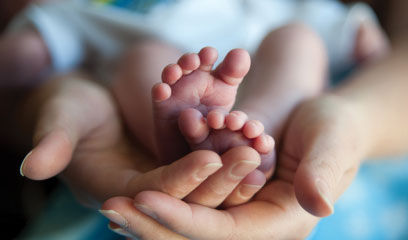 Let’s face it: Raising a baby is a lot of work! If we weren’t so crazy in love with our little bundles, it’s hard to imagine how we’d find the strength to raise them. It’s that love — that bond — that makes it all possible.
Let’s face it: Raising a baby is a lot of work! If we weren’t so crazy in love with our little bundles, it’s hard to imagine how we’d find the strength to raise them. It’s that love — that bond — that makes it all possible.
Bonding is the way babies form healthy attachment, which is essential for growth. “Attachment is critical for your whole life,” says Veronique Burke, MSW, LICSW, whose Seattle and Bellevue practices specialize in mother-infant psychotherapy. “Attachment is synonymous with relationship. It’s very important. Primary caretakers build the blueprints for how a child will relate to the rest of the world. It follows a baby for his whole life.”
Bonding occurs not just through the biology of pregnancy and birth, but also through others who have primary relationships with a baby. “My awareness of the need for bonding was heightened because we adopted our daughter,” says Melinda Mack of Whidbey Island, who researched attachment parenting and incorporated it into her plans for parenting. She did the things that felt critical for her family to bond, including breastfeeding, babywearing and co-sleeping. Now that her daughter is 10 years old, Mack continues to make attachment a priority. “I still experience that bubble with my daughter where there is nothing more important than this moment right now,” Mack says.
Bonding before birth
The act of bearing a child is the most intimate physical connection two humans can have, and that relationship offers opportunities for early bonding. Yet, bonding with an unborn child is not necessarily limited to the mother who shares the baby’s blood supply. A newborn baby will recognize voices that she hears in utero. She will find familiar voices and sounds comforting from the moment she arrives.
You can even take steps during the prenatal period to enhance bonding. “I talk to moms in the third trimester about checking in with their baby,” says Audrey Levine, a certified professional midwife at Arcadia Home Midwifery Care in Olympia. “I encourage them to take at least 10 minutes a day to really tune in and have some quiet time with the baby.”
Tracy McDaniel, a naturopathic doctor and midwife at One Sky Wellness Associates in Seattle, also considers prenatal bonding important. “I talk to the baby as I perform prenatal exams,” she explains, which encourages parents to consider doing the same.
Bonding after birth
Labor and birth pose unique opportunities for bonding. “I try to avoid separating mothers from their babies for the first few hours after birth,” says Levine. She encourages parents and babies to have immediate skin-to-skin contact, gaze into each other’s eyes and just soak up the experience of meeting for the first time.
Sometimes separation at birth is necessary, but doesn’t mean bonding won’t occur. It just means that parents and babies may need a little extra support as they form their relationships. “We are not sheep and we are not geese,” says Barbara Orcutt, RN, MN, coordinator of breastfeeding services for the Community Birth & Family Center in Seattle. “We are humans and we can adapt. Humans can form attachments at a variety of times and in a variety of ways. We are very flexible in this way.”
 Newborn bonding
Newborn bonding
Bonding with a newborn requires us to slow down, according to Burke. “Babies live on a different rhythm than adults do. It can be difficult to slow down and adapt to their rhythm.”
Slowing down allows you to really get to know your baby. “Learning baby’s cues is critical,” says Burke. By spending time with your baby, you will learn what his cries mean, what calms him, how he approaches the world and who he is in general.
“I kept my babies in slings and carriers at my eye level,” says Betty Fitzsimmons, a Tacoma mother of 11 children. “They saw the world through my eyes. I also breastfed them exclusively, which meant that I kept them with me most of the time.”
What if you just don’t enjoy slowing down to a baby’s pace? It’s not necessary to follow a specific prescription for bonding, but to find the way that works for you and your baby. Some people will find that co-sleeping is a wonderful way to become connected, while others won’t be able to get a wink of sleep with a baby so close at night. It’s important to know that bonding doesn’t happen the same way for everyone, and it doesn’t always happen easily. “If you don’t fall in love with your baby immediately,” says Burke, “that’s OK. Like any relationship, it builds on itself. It’s a process of repeated interactions that create patterns in your baby’s brain.”
Burke, who also leads Listening Mothers and other groups for Family Services, recommends that new parents find support to help them bond with their babies. “It’s hard work,” she says. Parents who have trouble bonding often have an idealized notion of parenting, according to Burke. “They think that everything should be perfect. When it’s not, they interpret it with self-judgment.”
Breastfeeding and bonding
“Breastfeeding isn’t essential to mother-infant attachment,” says Orcutt, “but it does make attachment easier.” There are several possible reasons why: When you nurse your baby, she is at the optimal distance from your face to focus and learn it. Infant suckling releases oxytocin in the mother, which is often called “the love hormone” because it promotes a sense of well-being. Suckling also helps promote uterine contractions immediately after birth, which assist in the mother’s recovery.
Betty Fitzsimmons believes that breastfeeding helped her bond with her children. “Breastfeeding helped me learn my infants’ cues,” she says. “I could extend that reading of cues in other parts of their life, and as they grew older.”
Tera Schreiber is a freelance writer and the former executive director at Great Starts Birth & Family Education.
Great books on bonding with your baby
Our Babies, Ourselves: How Biology and Culture Shape the Way We Parent by Meredith F. Small
Raising an Emotionally Intelligent Child by John Gottman, Ph.D., with Joan Declaire











